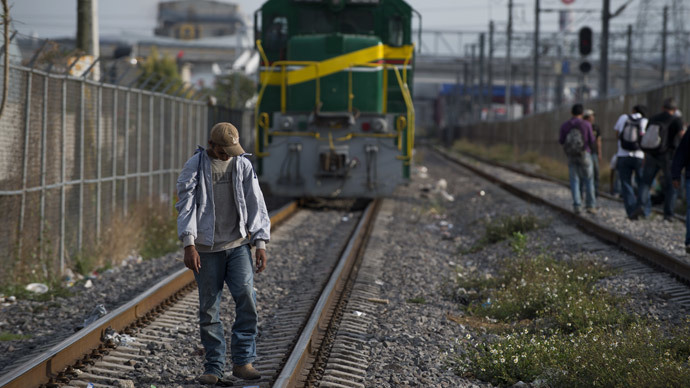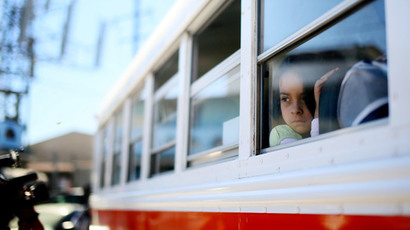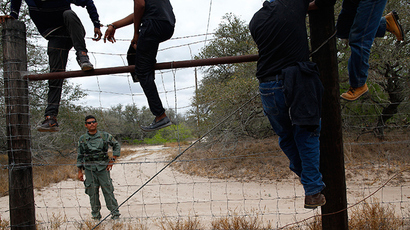Central American radio stations are playing anti-immigration songs paid for by the US government

The commissioner of the United States Customs and Border Protection says his agency’s new million-dollar multimedia campaign has “a very clear, simple and direct message.” The way that message is being conveyed, however, isn’t as transparent.
Unveiled during a July 2 press conference, the CBP’s “Dangers Awareness Campaign” involves hundreds of billboards and other public and print adverts across Central America and Mexico, as well as some 6,500 public service announcements for radio and TV, all intended to warn of the risks involved with trying to cross illegally into the US.
The agency’s latest effort, CBP Commissioner R. Gil Kerlikowske acknowledged when unveiling the campaign earlier this month, is “truly multimedia” and carries a most important message.
“We want to warn people of the dangers, and frankly we can’t do this without your help,” Kerlikowske said. “If you cross the border illegally, no matter what your age is, you’re not going to get legal papers. There is ‘no permiso.’ There is no permission to stay.”
The billboards and bus and road signage sponsored by the CBP and being placed primarily in Honduras, Guatemala and El Salvador carry an explicit message, which Kerlikowske practically repeatedly verbatim while touting the campaign during the July 2 presser.
“The journey is dangerous; children will not get legal papers if they make it; and these children need to be protected because they are our future,” he said.
One facet in particular of that multi-angled media campaign is now coming under attack, however, after a reporter at The Daily Beast raised questions over the weekend about the radio ads that are being bought across Central America by the US government and played over the airwaves to discourage would-be immigrants from attempting to cross the border.
According to journalist Caitlin Dickson, the agency’s “Dangers Awareness Campaign” relies on, among other tactics, the use of “subliminal songs” to scare would-be immigrants out of attempting to cross illegally into the US.
Indeed, the radio adverts purchased by the CBP aren’t immediately recognizable as public service announcements. Dickson reported on Saturday that among the PSAs being played in Central America are musical pieces extending upwards of four minutes long that discuss the risks involved with riding “La Bestia,” or “The Beast” — a notoriously dangerous freight train favored by immigrants willing to race over the border by any means necessary.

“Migrants from everywhere, entrenched along the rail ties. Far away from where they come, further away from where they go,” Dickson translates the song. “They call her the Beast from the South, this wretched train of death. With the devil in the boiler, whistles, roars, twists and turns.”
Dickson writes that Elevation, a Washington, DC-based advertising agency, worked with CBP on the “Dangers” campaign, as well as a similar one conducted a decade ago called “No Mas Cruces,” or “No More Crosses.”
“What makes the music seem a bit manipulative is the fact that the songs are played as part of the radio stations’ regular rotation, with no disclaimer about who's sponsoring them,” Dickson wrote. “Elevation sends radio stations two versions of the songs: one, complete, three to four minute version. Another one less than a minute long with a brief PSA at the end. Neither mentions Border Patrol or the US government — and that’s intentional. CBP knows that attaching its name to the campaign would immediately decrease its effectiveness.”
“It’s more important to us that the message be delivered,” Laurel Smith, director of communications and outreach for CBP told The Daily Beast. “We want to make sure the audience is listening.”
On the website of Elevation, the ad agency boasts that they “have an intuitive grasp on the Hispanic market,” and link to similar, pop music-styled radio jingles used on the campaign train by former-New York City Mayor Michael Bloomberg and the US Department of Homeland Security, which operates the CBP. Carlo Nicolau, the composer behind “La Bestia,” writes on his LinkedIn profile that focuses “on the emerging multicultural markets in the US and worldwide.”
“I thought I was really going to bed with the devil,” Nicolau told The Daily Beast. “I’d heard from many people that some of these Border Patrol agents are pretty shrewd. But I’ve learned that a lot of them are risking their lives to help people not die.”
“I really think that putting music to this message makes it very powerful, because people listen to the radio in their towns and their villages,” he said. “The songs don’t accuse anyone of wrongdoing, there are no heroes or villains in these stories. They are just letting people know that their lives are in danger.”
According to Kerlikowske, 220 would-be immigrants died during the last fiscal year while trying to enter the US illegally, and the Rio Grande River — the natural boundary between Mexico and Texas — has claimed 34 lives between last October and this past June.
Meanwhile, the US government says that upwards of 52,000 unaccompanied minors crossed the Mexican border into the United States in southwest Texas during the first half of the year, up 99 percent from 2013. Last week, the White House asked Congress for an additional $3.7 billion to go towards border control and related child health services. The CBP’s multimedia campaign, valued at only $1 million, will run for around 11 weeks, according to the Associated Press.
Contributor at MuckRock.com have already submitted Freedom of Information Act request in hopes of learning more about the costs of the Dangers Awareness Campaign.














